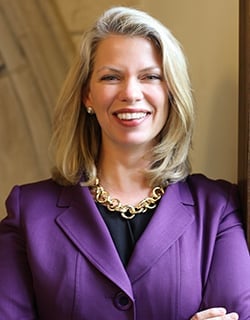Q&A: Julie Payne-Kirchmeier reflects on her time at Northwestern

Photo courtesy of Northwestern Now
Julie Payne-Kirchmeier. The Daily spoke with the outgoing vice president for Student Affairs about her time at Northwestern, how the school has changed and what she hopes NU’s future will look like.
June 20, 2022
Vice President for Student Affairs Julie Payne-Kirchmeier announced in April that she will leave Northwestern to become vice president for student success for the Indiana University system. Payne-Kirchmeier has worked at NU since 2012 and will begin her new role on Aug. 1.
The Daily spoke with Payne-Kirchmeier about her time at NU, how the school has changed and what she hopes the University’s future will look like.
This interview has been edited for brevity and clarity.
The Daily: Walk us through your experience at NU. What has your journey been like and what have been some of your takeaways? How does NU look different compared to when you started?
Payne-Kirchmeier: There’s a lot of things that look different that I think Northwestern should really be proud of. And one of them, even though we know there’s more to do, is this investment in the student-facing facilities that we have. There are significant investments in affinity spaces and other spaces where students can gather. There are so many things that we’ve invested in for students. But what happens is, you have four years of one student, so you have these groups and they see part of (what’s changed), but when you reflect back to 10 and a half years for me, 13 for (University President Morton Schapiro), there’s been a significant investment over time.
And then finally, our student body looks different. When it comes to BIPOC students, (it) is the most diverse student body we’ve ever had. When it comes to first-Generation, low-income (students) in the undergraduate student population, we’ve hit and surpassed the target that was set of 20% by 2020. We’re beyond that now and that’s good. Those are investments in the future, individual students, but also that kind of investment changes the trajectory for families. It makes Northwestern stronger. And I think it makes our student population stronger too.
The Daily: What have been some of the highlights of your time and what have been some of your biggest struggles?
Payne-Kirchmeier: My role in the building up of Student Enrichment Services in support of our first-generation, low-income students is huge for me. I think about how that started, and how a group of students came together, and met with the vice president and said, ‘Look, it’s great that we’re here, but we need different supports, we need different things than students who are second, third, fourth-generation in their family to go to college.’
And that the process we went through was really intentional and involving students to help us figure it out. We now have several staff members in that space that we are renovating — a midterm solution for a first-generation, low-income (student)-focused space that students were integral in helping us design — so that it didn’t just meet our needs, it really met the needs of the community. That is something that I was proud to be part of.
Another one for me has been centering the needs of BIPOC students in a number of different ways. This work is never done, there’s a lot more to do, but I’m thinking about the investment and the commitment that was made to making sure the Black House was done and the work that’s happening on the Multicultural Center right now. So you start to see this scaffolding of support for our students, in addition to support for faculty and staff, and that moves equity and inclusion work away from a stated value and makes it a priority.
And then the third is around the commitment to student mental health. I know there’s a lot of activism around mental health and wellness, but that commitment from Northwestern, oftentimes through Student Affairs, has been there since I got here. And we’ve seen not just, again, dollars committed, but trainings are different — the recent addition of TimelyCare, the investments that we’ve been making and then even looking beyond that to say, ‘How can we invest in mental health services that are culturally relevant and culturally responsive?’
The Daily: How do you hope that your impact will be remembered by students, staff and colleagues?
Payne-Kirchmeier: I am never a leader that wants to center myself. It’s never about me, the work I do. I’ve been doing this my whole life, this is my profession, and on some level it means that it’s connecting with me deeply. If you hear me get a little bit choked up, it’s because I believe that. It’s always about (the students).
When I think about legacy, if we’ve been able to curate a culture here — whether it’s with the division or with the University — that really remembers to ask itself questions like, ‘If we make this decision, how will that impact students?’ And more importantly, ‘How will that center the needs of our most vulnerable students in the decision making itself?’ If we can do that, then everything Northwestern does will be far more successful.
Email: [email protected]
Twitter: @isabeldfunk
Related Stories:
— Julie Payne-Kirchmeier to depart Northwestern for role with Indiana University system
— Payne-Kirchmeier appointed vice president for Student Affairs
— Patricia Lampkin announced as new interim vice president for Student Affairs

